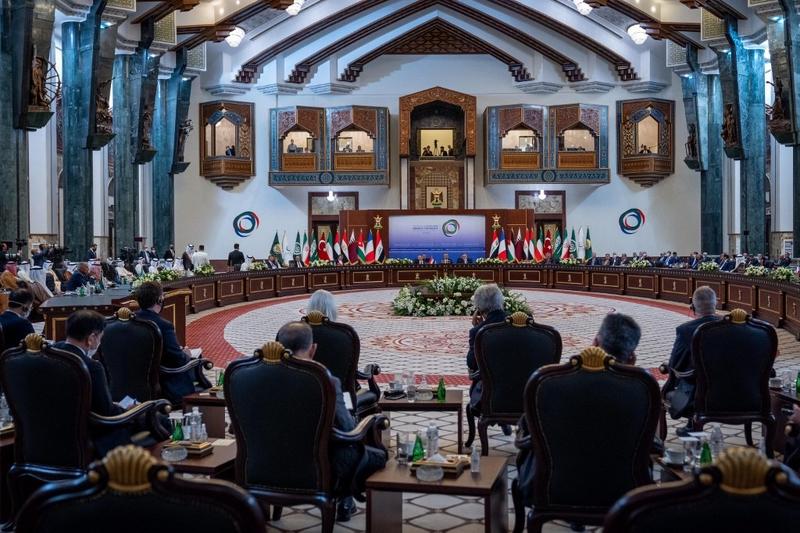 A handout picture released by Jordan's Royal Palace media office shows a general view of Baghdad's conference on August 28, 2021 which was attended by Jordan's King Abdullah II, the French president and several regional leaders and officials. (YOUSEF ALLAN / JORDANIAN ROYAL PALACE / AFP)
A handout picture released by Jordan's Royal Palace media office shows a general view of Baghdad's conference on August 28, 2021 which was attended by Jordan's King Abdullah II, the French president and several regional leaders and officials. (YOUSEF ALLAN / JORDANIAN ROYAL PALACE / AFP)
Iraq’s regional allies stressed Saturday the need to provide support to an OPEC member struggling to rebuild after decades of ruinous wars, in a conference that also afforded a platform for meetings between longtime rivals.
French President Emmanuel Macron, and his Egyptian counterpart attended the event, along with leaders and top diplomats from the United Arab Emirates, Qatar, Kuwait, Saudi Arabia and Jordan. They were also joined by Turkey’s foreign minister Mevlut Cavusoglu as well as Iran’s newly confirmed foreign minister, Hossein Amirabdollahian.
Iraq’s internal situation “is linked to the region,” the country’s foreign minister, Fouad Hussein, said in a press conference
All voiced support for efforts to ensure security and stability in Iraq, which has, over the past years, served as a venue for regional power struggles as well as a safe haven for Islamist extremists.
Iraq’s internal situation “is linked to the region,” the country’s foreign minister, Fouad Hussein, said in a press conference. “The stability of Iraq means stability of the whole region.”
ALSO READ: Iraq seeks to ease Saudi-Iran hostility at Baghdad summit
That suggested the focus on regional cooperation was as much on keeping those conflicts out of the oil-rich nation as it was about paving the way for bringing opposing sides to the same table.
Those efforts would be of benefit to all. Iraq, which is predominately Shiite, had been largely on the periphery in the predominantly Sunni Muslim Arab world. That opened the door for greater influence by Iran, which is also predominantly Shiite. Bringing Iraq closer into the Arab fold would help diminish Iranian influence.
The conference’s closing statement gave clear voice to those links. It said the participants “welcome the tireless Iraqi diplomatic efforts to reach a common ground at the regional and international level” to help bolster economic, political and security cooperation.
“Baghdad’s hosting of this conference is a clear evidence of Iraq’s adoption of a policy of positive balance and cooperation in its foreign relations,” it said.
ALSO READ: Iran open to Saudi talks as Iraq pushes mediation to ease feud
The Arab League’s chief, Ahmed Aboul-Gheit, put it more directly in his opening remarks earlier in the day. “We don’t want Iraq to turn into an arena for conflict,” he said.
Iraqi officials had stressed throughout that the main aim of the event was to find ways to help the country rebuild. On the sidelines, however, countries such as the UAE and Qatar, as well as Egypt and Qatar, held talks, according to Arab media. The UAE and Iran also held talks.
Iraq’s foreign minister said meetings between Iran and Saudi Arabia are continuing, and “we understand is that both parties have the will to reach positive results for all problems.”
The stakes are high for Iraq. Prime Minister Mustafa Al-Kadhimi, while trying to short up the country’s economy, is also navigating the country’s complicated internal politics, even as he’s pulled between powerful, competing parties.
France’s Macron, said his country would maintain its presence in Iraq to help combat terrorism regardless of what the US decides, and for as long as the Iraqi government requests support. France has sufficient operational capacity with or without the US, Macron added at a news conference on Saturday.
READ MORE: Iran and Iraq commit to boosting border cooperation and trade
Macron also said that France would announce on Aug 29 “a number of projects” in fields such as teaching and health, that would allow displaced Iraqis to return to their homes.
Meanwhile, Iran’s Amirabdollahian said his country welcomes “any Iraqi-led regional initiative that comes with the participation of the countries in the region,” according to the foreign ministry’s official Telegram account.
“Economic resources must be spent to reach a coalition for peace and development,” he said, adding that Iran is ready to develop bilateral ties with Iraq.


